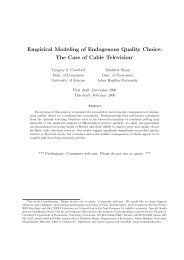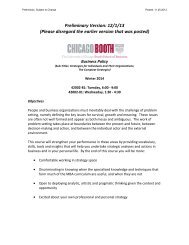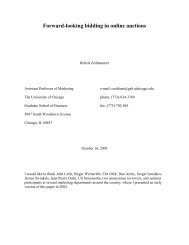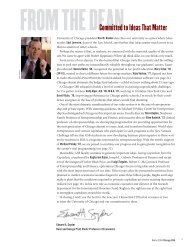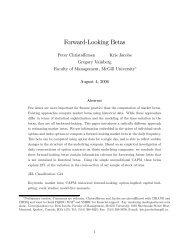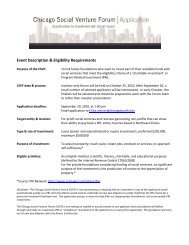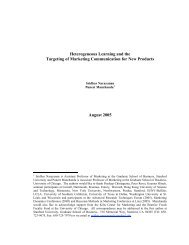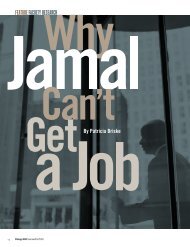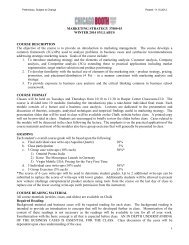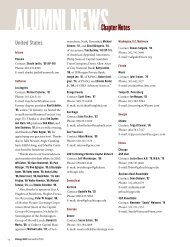How VCs Choose Entrepreneurs - The University of Chicago Booth ...
How VCs Choose Entrepreneurs - The University of Chicago Booth ...
How VCs Choose Entrepreneurs - The University of Chicago Booth ...
Create successful ePaper yourself
Turn your PDF publications into a flip-book with our unique Google optimized e-Paper software.
FEATURE FACULTY RESEARCH<br />
Will the customers buy it?’ That’s the opportunity,”<br />
Kaplan said.<br />
When it comes to the management team,<br />
however, Kaplan and Stromberg said entrepreneurs<br />
<strong>of</strong>ten meet with potential investors<br />
even when their team is short a few members.<br />
“When investors go to meet with them, they<br />
find out the team is not complete,” Stromberg<br />
said. And in their paper, they write, “<strong>VCs</strong><br />
play a large role in shaping and recruiting the<br />
senior management team. In at least half<br />
<strong>of</strong> the investments, the VC expects to play an<br />
important role in recruiting management.”<br />
Gallagher agreed. “We’re frequently<br />
involved in helping the CEO pick the senior<br />
people,” he said. “Experienced <strong>VCs</strong> should<br />
know about selecting people because we’ve<br />
had a lot <strong>of</strong> experience.”<br />
<strong>VCs</strong> also have certain expectations <strong>of</strong><br />
the entrepreneur at the helm. Stromberg said,<br />
“You look to see how much experience he<br />
or she has, whether they’re focused. You look<br />
for frugality because you don’t want to give<br />
$2 million to someone who’s going to go <strong>of</strong>f<br />
and just waste it.”<br />
When it comes time to draft the contractual<br />
agreement, the more uncertainty <strong>VCs</strong> face,<br />
the greater control they seek in the venture.<br />
“One problem arises when the investor doesn’t<br />
know what the entrepreneur is thinking,”<br />
Kaplan said. “That’s known as adverse selection.<br />
<strong>The</strong> other problem is that after he’s<br />
given the entrepreneur some money, the VC<br />
doesn’t know what the guy’s doing with it.<br />
That’s called moral hazard.”<br />
<strong>How</strong> these decisions play out in the<br />
long run is hard to say, though. When the<br />
researchers tracked the success <strong>of</strong> this<br />
sample <strong>of</strong> 67 firms, Kaplan said, “A fourth <strong>of</strong><br />
them have gone public, another fourth have<br />
been liquidated, and on about half <strong>of</strong> them,<br />
the jury’s still out. But,” he pointed out,<br />
“you wouldn’t expect everyone to succeed.”<br />
Still, studying successful companies has<br />
value, Kaplan and Stromberg wrote. “If anything,<br />
a bias toward more successful <strong>VCs</strong><br />
would be helpful because we are more likely<br />
to have identified the methods used by<br />
sophisticated, value-maximizing principals.”<br />
What Makes a Good Entrepreneur<br />
“[Good entrepreneurs have] a lot <strong>of</strong> experience<br />
in that industry. <strong>The</strong>y’ve been a successful<br />
entrepreneur before,” Kaplan said. “Having<br />
a complete team is important; so if you’ve got<br />
one good person, can you fill it out?”<br />
Having a good grasp <strong>of</strong> the financial situation<br />
is equally important, Stromberg added.<br />
“Frugality and being able to realistically budget<br />
and forecast is pretty important.” That<br />
“<strong>The</strong> inability [<strong>of</strong> entrepreneurs] to forecast<br />
financial progress is a relatively common<br />
complaint <strong>of</strong> <strong>VCs</strong>.”—Per Stromberg<br />
quality is <strong>of</strong>ten absent, he said. “<strong>The</strong> inability<br />
to forecast financial progress is a relatively<br />
common complaint <strong>of</strong> <strong>VCs</strong>.”<br />
When it comes to personality traits and<br />
abilities among entrepreneurs, Gallagher looks<br />
for four specific qualities. “<strong>The</strong>y’ll need<br />
intelligence because, unlike corporate CEOs,<br />
entrepreneurs won’t be surrounded by<br />
experienced staff and will <strong>of</strong>ten be dealing<br />
with stuff they’ve never seen before. Resourcefulness<br />
is important because an entrepreneur<br />
may have a great idea but not have<br />
the time or capital. <strong>The</strong>y have to be openminded<br />
because they may have to deal with<br />
situations that are different than they’d anticipated;<br />
for example, the competition may<br />
be tougher than they thought. <strong>The</strong>y have to<br />
search for ways to improve their company<br />
regardless <strong>of</strong> the source <strong>of</strong> the idea, and that<br />
includes what their competitors are doing. And<br />
they’ll have to have an inner self-confidence,<br />
because the whole team will draw strength<br />
from that,” Gallagher said.<br />
“If an entrepreneur isn’t open-minded,<br />
we usually have to replace that person.”<br />
Nohra listed similar qualities. “A good<br />
entrepreneur is motivated, aggressive, very<br />
bright, and focused. But,” he cautioned,<br />
“those same qualities can work against you,<br />
too. For instance, stubbornness—misguided<br />
motivation—is not good when you’re wrong.<br />
And the odds are so stacked against you, you<br />
almost have to be unrealistically optimistic.”<br />
Kaplan and Stromberg came up with<br />
their own ideas <strong>of</strong> what makes an entrepreneur<br />
successful. “<strong>VCs</strong> are going to do a<br />
lot <strong>of</strong> due diligence,” Kaplan said. “And<br />
you’d better have a management team made<br />
up <strong>of</strong> the right people who can do what<br />
they say they’re going to do. In terms <strong>of</strong> the<br />
opportunity, you’ve got to nail down answers<br />
to questions like, ‘Is it a big enough market<br />
to be attractive? Is it something customers<br />
are going to buy?’ ”<br />
<strong>The</strong> research also gives entrepreneurs a<br />
strong sense <strong>of</strong> what to expect in a contract.<br />
“It helps if you can look at them in a rational<br />
way. In one instance, we had a guy who<br />
was negotiating with venture capitalists.<br />
Before he read our paper, he thought, ‘This<br />
is awful. <strong>How</strong> can they do this? It’s outrageous,’<br />
” Kaplan recalled. “<strong>The</strong>n he read our<br />
paper and said, ‘OK, now I understand why<br />
they’re doing that; it makes sense. And here’s<br />
where I can negotiate.’ Or, ‘<strong>The</strong>re’s nothing<br />
I can do; this is the way it is.’”<br />
Stromberg said, “<strong>Entrepreneurs</strong> can also<br />
say, ‘Here’s where I’m getting a particularly<br />
bad deal, compared to the average guy.’”<br />
GSB students have access to the research<br />
if they take Kaplan’s course, Entrepreneurial<br />
Finance and Private Equity. “I teach how to<br />
evaluate the deal, which is based on paper<br />
number two. I also go over how you should<br />
negotiate the contract, and that’s based on<br />
paper number one. I hand them out,” Kaplan<br />
said. Teaching also gave Kaplan access to the<br />
venture capitalists who ultimately provided<br />
the data for the research.<br />
Kaplan and Stromberg’s next step is to<br />
see how their theories hold up internationally.<br />
<strong>The</strong>y collected data from companies in 16<br />
countries. “<strong>The</strong> U.S. clearly has been at the<br />
maximum in terms <strong>of</strong> entrepreneurial activity<br />
and venture capital. Is that because <strong>of</strong> the<br />
legal environment or the tax situation? Can<br />
you write similar contracts in other countries,<br />
Faculty Work is Available Online<br />
• For research on the Internet’s effect on commerce by Austan D. Goolsbee,<br />
pr<strong>of</strong>essor <strong>of</strong> economics, go to gsbadg.uchicago.edu/vitae.htm.<br />
• For work on strategies and innovation, particularly in high-tech industries,<br />
by Toby Stuart, Fred G. Steingraber–A.T. Kearney Pr<strong>of</strong>essor <strong>of</strong> Organizations<br />
and Strategy, go to gsbwww.uchicago.edu/fac/toby.stuart/research/.<br />
• For additional research by Kaplan, go to gsbwww.uchicago.edu/fac/<br />
steven.kaplan/research/.<br />
For additional research by Stromberg, go to gsbwww.uchicago.edu/fac/<br />
per.stromberg/research/.<br />
or are there impediments? If you can, then<br />
you predict there will be more entrepreneurship,”<br />
Kaplan said.<br />
Regardless <strong>of</strong> all the variables—the kind <strong>of</strong><br />
start-up, the experience <strong>of</strong> the entrepreneur,<br />
the contingencies in the contract—every<br />
agreement comes down to the same thing,<br />
Kaplan said.<br />
“All you need is two people to agree.”<br />
26 <strong>Chicago</strong> GSB Summer/Fall 2002<br />
Summer/Fall 2002 <strong>Chicago</strong> GSB 27



